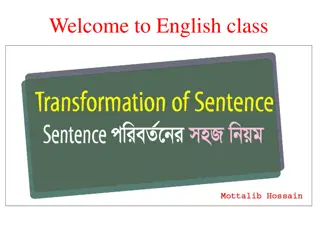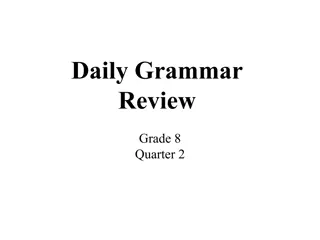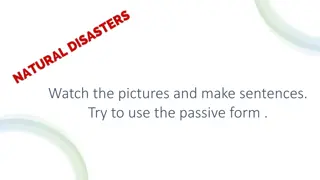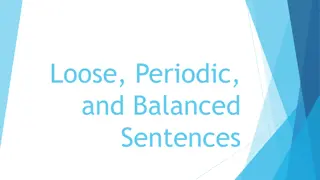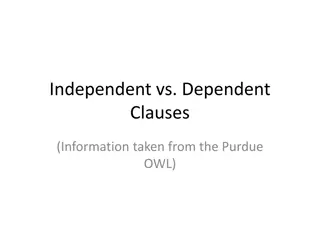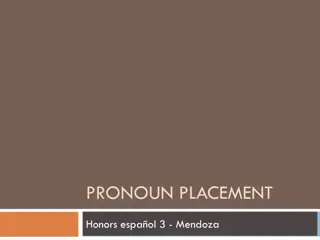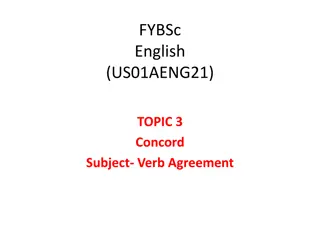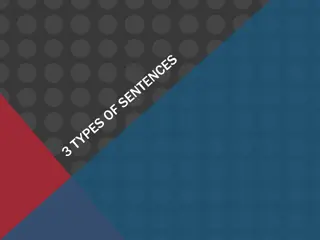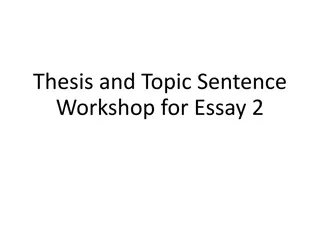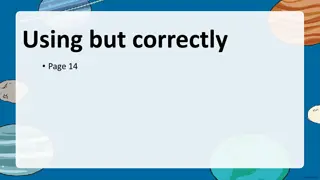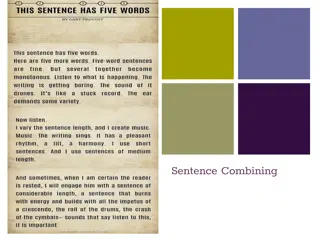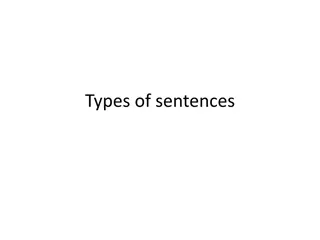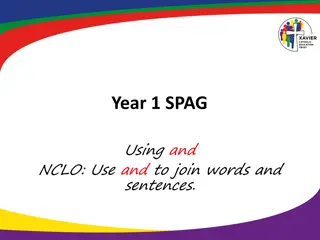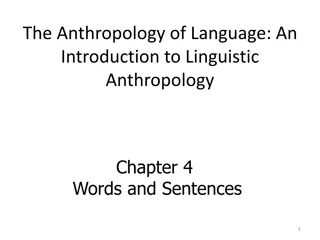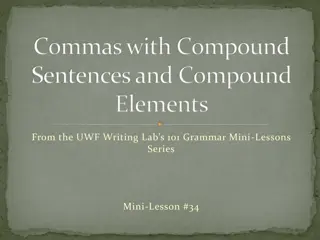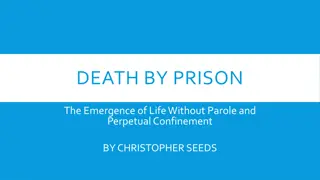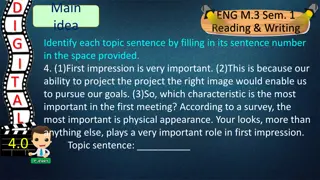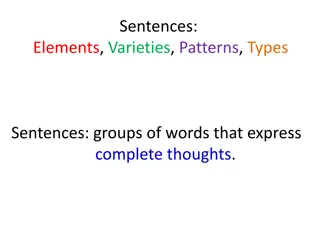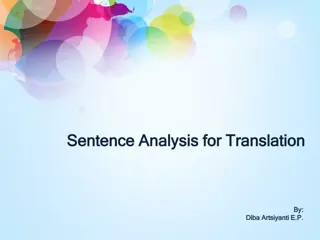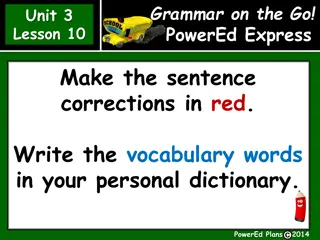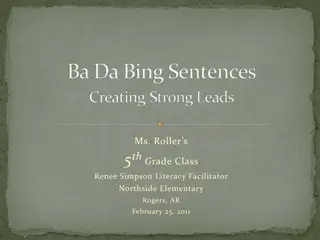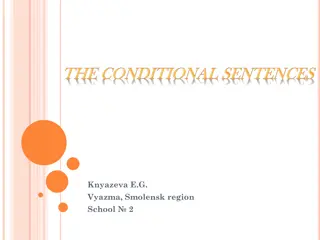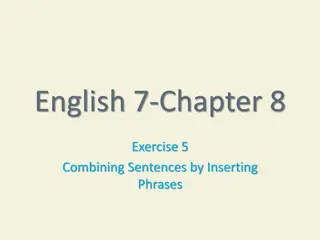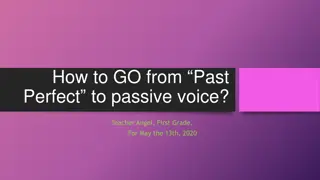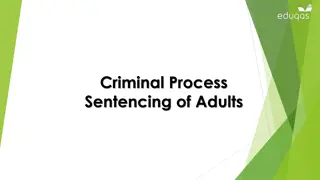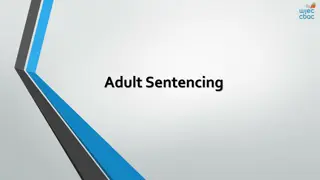Mastering Assertive to Exclamatory Sentences: A Comprehensive Guide
Dive into the world of changing sentence structures with a focus on transforming assertive sentences to exclamatory ones. Explore the importance of using exclamatory sentences to express strong emotions and learn various examples and models to enhance your understanding and mastery of this skill.
2 views • 25 slides
English Transformation Rules: Assertive to Interrogative with Examples
Learn the rules of transforming assertive sentences into interrogative sentences in English grammar. Understand the different scenarios and examples for the transformation process. Enhance your skills in using interrogative sentences in various situations while maintaining the original meaning. Dive
1 views • 23 slides
Daily Grammar Review Challenges for Grade 8 Students
Engage in a week-by-week grammar review for 8th-grade students. The lessons consist of identifying declarative or interrogative sentences, punctuating sentences with periods or question marks, and distinguishing between exclamatory and imperative sentences. Enhance your grammar skills with daily exe
1 views • 61 slides
Understanding Introductory Phrases and Clauses in Grammar
Learn how to properly use introductory words and clauses in sentences by understanding when to add commas before independent clauses. Explore examples and practice sentences from the song "Happy" by Pharrell Williams. Enhance your grammar skills and create well-structured sentences with this informa
1 views • 115 slides
Passive Form Usage in Picture Sentences
Images depicting different scenes are provided to practice forming passive sentences. The sentences should aim to use passive voice construction, showcasing an understanding of this grammatical structure through visual prompts.
2 views • 8 slides
Understanding Predicators and Predicates in Sentence Semantics
Exploring the semantics of sentences, this content delves into the structure of declarative sentences in terms of predicators and arguments. It discusses various classes of items that can function as the predicator of a sentence, such as lexical verbs, the copulative verb "be" in equative sentences,
1 views • 39 slides
Understanding Loose, Periodic, and Balanced Sentences
Explore the definitions, rhetorical purposes, and examples of loose, periodic, and balanced sentences. Understand how these sentence structures impact readability and communication. Learn to differentiate between loose sentences with the main point at the beginning and periodic sentences with the ma
0 views • 18 slides
Understanding Independent vs. Dependent Clauses
Independent clauses express complete thoughts and can stand alone as sentences, while dependent clauses require an independent clause for support. Learn about coordinating conjunctions, comma splices, and run-on sentences to enhance your understanding of sentence structure. Avoid common errors by re
1 views • 10 slides
Pronoun Placement Rules in Spanish Sentences
Clear up confusion around the placement of reflexive, direct object, and indirect object pronouns in Spanish sentences and commands. Learn the placement rules for different types of pronouns in statements and commands, including examples for single-verb and two-verb sentences. Understand the order o
2 views • 10 slides
Understanding Subject-Verb Agreement in English Sentences
Subject-verb agreement is crucial in English grammar to ensure sentences are grammatically correct. The subject of a sentence must agree with the verb in terms of gender, number, person, and case. Incorrect use of verb can lead to ungrammatical sentences. Learn how the subject and verb should match
0 views • 28 slides
Understanding Types of Sentences in English Grammar
Simple, compound, and complex sentences are fundamental components of English grammar. Simple sentences express a single complete thought, compound sentences combine two independent clauses with a conjunction, and complex sentences consist of an independent clause and one or more dependent clauses.
2 views • 12 slides
Understanding Completing Sentences in English Grammar for Classes 9-10
Delve into the concept of completing sentences with Assistant Teacher Z.M. Akhtarul Kabir from Wazuddin High School. Learn the definition, rules, and examples of completing sentences with various tenses like present indefinite, past indefinite, and past perfect. Enhance your grammar skills and abili
0 views • 17 slides
English Class Column Matching Practice for Learning Complete Sentences
In this English class practice session, students will learn to match parts of sentences to create complete sentences. The practice involves columns A, B, and C with sentences focusing on education, wisdom, moon and sun relationships, and national flag symbolism. By the end of the lesson, students wi
0 views • 21 slides
Crafting Effective Topic Sentences for Academic Essays
Understanding the importance of topic sentences in academic writing is crucial for creating cohesive and well-structured essays. This workshop explores the role of topic sentences in connecting paragraphs to the thesis statement, providing examples and guidance on how to craft effective topic senten
0 views • 7 slides
Understanding Sentence Structure: Simple and Compound Sentences Explained
Learn about the characteristics of simple and compound sentences with examples. Understand how to use conjunctions like "and" and "but" to connect ideas in sentences. Practice creating sentences using these structures and improve your writing skills.
0 views • 12 slides
Understanding Sentence Structure: Phrases, Clauses, and Compound Sentences
Learn about phrases, clauses, simple sentences, conjunctions, and compound sentences in English grammar. Understand the differences between independent and dependent clauses, how to form compound sentences using conjunctions, and practice writing sentences about Justin Bieber. Explore the components
1 views • 21 slides
Understanding the Four Types of Sentences
Declarative, imperative, interrogative, and exclamatory sentences each serve a unique purpose in communication. Declarative sentences state facts, imperatives give commands, interrogatives ask questions, and exclamatory sentences express strong emotions. By recognizing the characteristics of each ty
0 views • 18 slides
Fun with Connecting Words: Using 'And' to Join Sentences
Explore the concept of using the word "and" to join words and sentences together. Practice joining phrases, sentences, and creating silly sentences. Engage in activities to understand sentence structure and enhance language skills.
0 views • 10 slides
Fun with Writing: Simple Sentences and Wow Words Exploration
Explore the fundamentals of writing with simple sentences and enhancing vocabulary using wow words. Learn how to construct sentences, identify parts of speech, and make your writing more engaging through descriptive language. Practice by creating your own sentences and incorporating new vocabulary.
0 views • 12 slides
Understanding Structurally Sentences: Simple, Compound, and Complex
Learn about structurally sentences - simple, compound, and complex. Understand the different sentence types, learn to make sentences using these structures, and explore the use of coordinating and subordinating conjunctions. Enhance your skills in changing sentence structures and grasp the essence o
0 views • 19 slides
Understanding Sentence Structure: Simple, Compound, and Complex Sentences
Explore the basics of sentence structure through simple sentences with one independent clause, compound sentences containing multiple independent clauses, sentence fragments, and complex sentences combining an independent clause with a dependent clause. Examples and guided practice included.
0 views • 22 slides
The Anthropology of Language: Words and Sentences Overview
Explore the anatomy of language from morphology to syntax, delving into the structure of words, morphemes, and sentences. Understand the analysis of morphemes and their arrangements, the descriptions of bases forming words, kinds of bases like roots and stems, and creating a language from base forms
0 views • 31 slides
Mastering Commas in Compound Sentences
Learn how to effectively use commas in compound sentences and compound elements. Discover when to include commas before coordinating conjunctions that separate complete sentences and when it's appropriate to leave them out for short sentences. Understand when not to use commas when coordinating conj
0 views • 4 slides
Evolution of Life Sentences: From Parole to Perpetual Confinement
The shift in the interpretation and implementation of life sentences in the US, particularly regarding life without parole (LWOP), has seen a transformation from a system emphasizing rehabilitation and potential release to one focused on retribution and incapacitation. This transition has led to the
0 views • 11 slides
Understanding Topic Sentences in Writing
Topic sentences are vital in writing as they introduce the main idea of a paragraph and provide a clear focus. They must be complete sentences, not questions, facts, or incomplete thoughts. This presentation explores the characteristics of topic sentences and their importance in composing well-struc
0 views • 19 slides
Understanding the Importance of Topic Sentences in Reading and Writing
Effective topic sentences are crucial in conveying the main idea of a paragraph. This exercise highlights the significance of topic sentences in various contexts, including first impressions, criminal justice, and product marketing. By identifying and analyzing topic sentences, readers can better co
0 views • 19 slides
Transforming Complex Sentences to Simple Sentences - Lesson Overview
In this lesson, students will learn how to transform complex sentences to simple sentences in English grammar. The lesson covers the structure of complex sentences using conjunctions like "Though" and "Although" and guides students on converting them into simple sentences with expressions like "In s
0 views • 12 slides
Understanding Types of Sentences in English Grammar
Types of sentences in English grammar include clauses - independent and dependent. Independent clauses stand alone, expressing complete thoughts, while dependent clauses rely on independent clauses. Different types of sentences include simple, compound, complex, and compound/complex sentences. Simpl
0 views • 41 slides
Understanding the Four Types of Sentences
Learn about the four types of sentences: declarative, interrogative, imperative, and exclamatory. Understand the differences between sentences and fragments, and see examples of each type in practice. Discover how to identify and use these different types of sentences effectively.
0 views • 9 slides
Understanding Sentences: Elements, Types, and Structure
Explore the essential elements of sentences, including subjects and predicates. Learn how to identify subjects and predicates in sentences to ensure they make sense. Discover examples of complete sentences and the components that make them whole.
0 views • 21 slides
Understanding Sentence Components and Structures
Unravel the essentials of sentence analysis for accurate translation. Explore simple sentences, subjects, verbs, and objects, along with parts of speech, compound and complex sentences, and the significance of clauses in constructing sentences effectively.
0 views • 18 slides
Grammar on the Go! PowerEd Express Unit 3 Lesson 10 Corrections and Concepts
Enhance your grammar skills with corrections of sentences, understanding types of sentences, correcting homophones, fragments, and punctuation in simple sentences. The lesson covers grammar concepts like homophones, fragments, end punctuation, and simple sentences.
0 views • 9 slides
Enhancing Writing Skills Through BaDaBing Sentences in 5th Grade Class
Engage students in creating strong leads by implementing the GANAG structure and focusing on high-yield strategies like identifying similarities, using cooperative learning, and setting clear objectives. The lesson led by Ms. Simpson at Northside Elementary introduces the concept of strong leads, pr
0 views • 21 slides
Automatic Extraction Model of Thesis Research Conclusion Sentences
Full-text academic literature contains rich data that can be analyzed using machine learning techniques. This research focuses on extracting thesis research conclusion sentences automatically to enhance summarization processes. The study involves data processing, annotation, and creating discriminan
0 views • 9 slides
Understanding Conditional Sentences: Types and Usage Explained
Conditional sentences are complex sentences with a subordinate clause of condition, usually starting with "IF". Learn about zero, first, second, third, and mixed conditional sentences, their structures, and examples to enhance your understanding and usage of different types of conditionals.
0 views • 13 slides
Combining Sentences Using Phrases in English Language
Learn how to combine sentences by inserting phrases in English language. Practice exercises on rephrasing sentences to improve writing skills. Explore examples of combining sentences through phrase insertion with the Inuit culture as the context.
0 views • 12 slides
Transforming Sentences from Past Perfect to Passive Voice
Learn how to convert sentences from the Past Perfect tense to Passive Voice with clear examples and a step-by-step guide. Understand the formula and rules for changing active voice sentences to passive voice sentences in English grammar. Explore how singular and plural subjects affect the transforma
0 views • 9 slides
Overview of Adult Sentencing in Criminal Justice
Adult sentencing in criminal justice involves four main categories of sentences available to the court: custodial sentences, community sentences, fines, and discharges. Custodial sentences for adults can range from weekend prison to life imprisonment, with mandatory life sentences for certain seriou
0 views • 21 slides
Understanding Adult Sentencing and Custodial Sentences
Adult sentencing involves 4 main categories of sentences: Custodial sentences (including mandatory life sentences), Community sentences, Fines, and Discharges. Custodial sentences for adult offenders can vary in duration from weekend prison to whole life imprisonment, with some offenses mandating a
0 views • 24 slides
Understanding Complex and Compound Sentences: Conversion and Examples
Learn about the differences between complex and compound sentences, identify principal and sub-ordinate clauses, and understand how to convert complex sentences to compound sentences. Explore examples and practical tips for effective sentence structuring.
0 views • 19 slides

